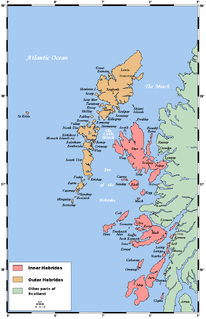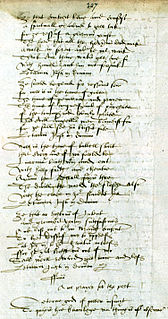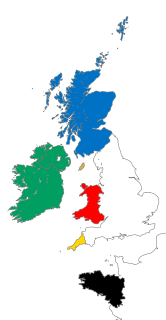The bard's blessing (Scottish Gaelic : beannachadh-bàird) or poet's congratulation, was the custom of old in the Scottish Highlands of old, to meet the bride coming forth from her chamber with her maidens on the morning after her marriage and to salute her with a poetical blessing called beannachadh-bàird.

The Highlands is a historic region of Scotland. Culturally, the Highlands and the Lowlands diverged from the later Middle Ages into the modern period, when Lowland Scots replaced Scottish Gaelic throughout most of the Lowlands. The term is also used for the area north and west of the Highland Boundary Fault, although the exact boundaries are not clearly defined, particularly to the east. The Great Glen divides the Grampian Mountains to the southeast from the Northwest Highlands. The Scottish Gaelic name of A' Ghàidhealtachd literally means "the place of the Gaels" and traditionally, from a Gaelic-speaking point of view, includes both the Western Isles and the Highlands.

A bride is a woman who is about to be married or who is newlywed.

In a building, a room is any space enclosed within four walls to which entry is possible only by a door that connects it either to a passageway, to another room, or to the outdoors, that is large enough for several persons to move about, and whose size, fixtures, furnishings, and sometimes placement within the building support the activity to be conducted in it.
The earliest reference to beannachadh bàird comes from the postscript of a letter from Professor Garden to John Aubrey, written in Aberdeen 1691–1692. The definition given came from a divinity student from Strathspey whose informant was his father, aged 97.
"A Bard in common Irish signifies a little poet or a fhymer, they use to travel thorow countries and caming into ane house, salute with a rhym called in Irish Beannacha p baird, i.e. the Bard's salutation qch is onlie a short verse or rhym touching the praise of the master and mistris of the house."
If at any jovial meeting, any man retired, for however short a time, he was obliged, before he was permitted to resume his seat, to make an apology for his absence in rhyme.

One of the basic pieces of furniture, a chair is a type of seat. Its primary features are two pieces of a durable material, attached as back and seat to one another at a 90° or slightly greater angle, with usually the four corners of the horizontal seat attached in turn to four legs—or other parts of the seat's underside attached to three legs or to a shaft about which a four-arm turnstile on rollers can turn—strong enough to support the weight of a person who sits on the seat and leans against the vertical back. The legs are typically high enough for the seated person's thighs and knees to form a 90° or lesser angle. Used in a number of rooms in homes, in schools and offices, and in various other workplaces, chairs may be made of wood, metal, or synthetic materials, and either the seat alone or the entire chair may be padded or upholstered in various colors and fabrics.
A rhyme is a repetition of similar sounds in the final stressed syllables of two or more words. Most often, this kind of "perfect" rhyming is consciously used for effect in the final positions of lines of poems and songs. Less strictly speaking, a rhyme may also variously refer to other types of similar sounds near the ends of two or more words. Furthermore, the word rhyme has come to be sometimes used as a shorthand term for any brief poem, such as a rhyming couplet or nursery rhyme.
If he had no talent for poetry, or if, from humour he did not choose to comply, which was seldom the case, he was obliged to pay such a proportion of the reckoning as the company thought proper to propose. This according to Martin Martin was beannachadh-bàird.

Poetry is a form of literature that uses aesthetic and rhythmic qualities of language—such as phonaesthetics, sound symbolism, and metre—to evoke meanings in addition to, or in place of, the prosaic ostensible meaning.

Humour, also spelt as humor, is the tendency of experiences to provoke laughter and provide amusement. The term derives from the humoral medicine of the ancient Greeks, which taught that the balance of fluids in the human body, known as humours, controlled human health and emotion.
Martin Martin was a Scottish writer best known for his work A Description of the Western Islands of Scotland. This book is particularly noted for its information on the St Kilda archipelago. Martin's description of St Kilda, which he visited in 1697, had also been published some years earlier as A Late Voyage to St Kilda (1698).









